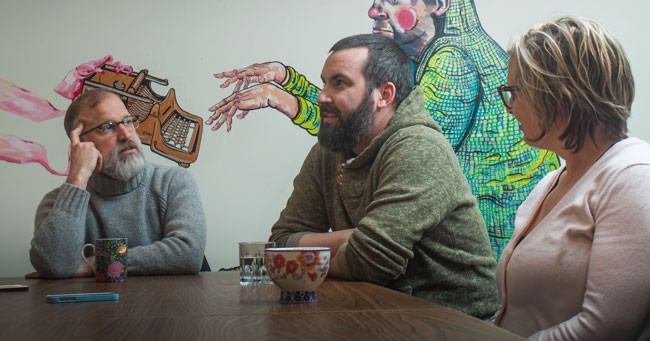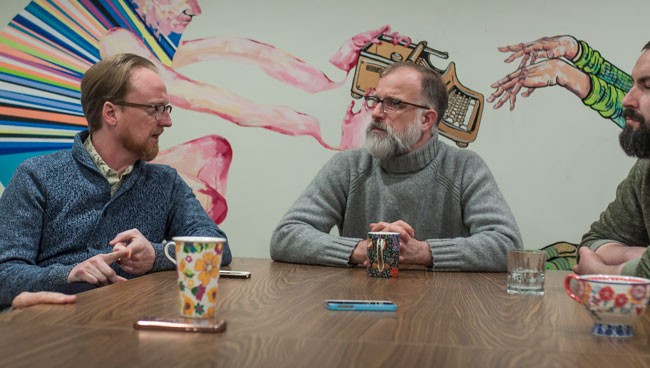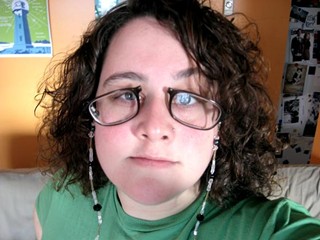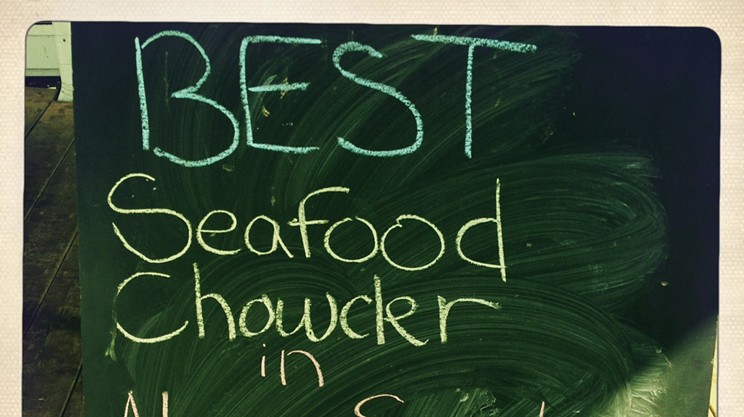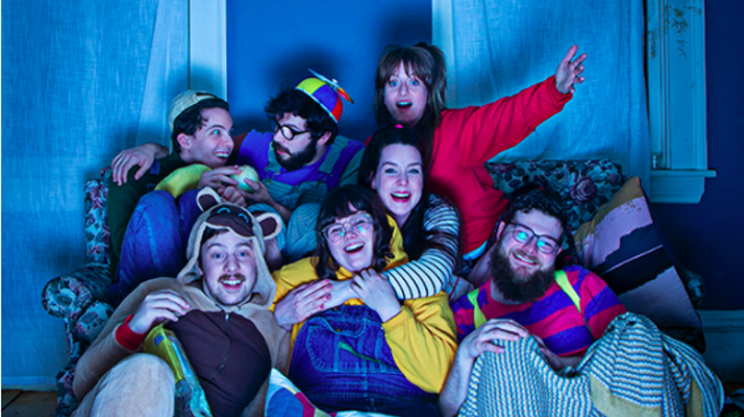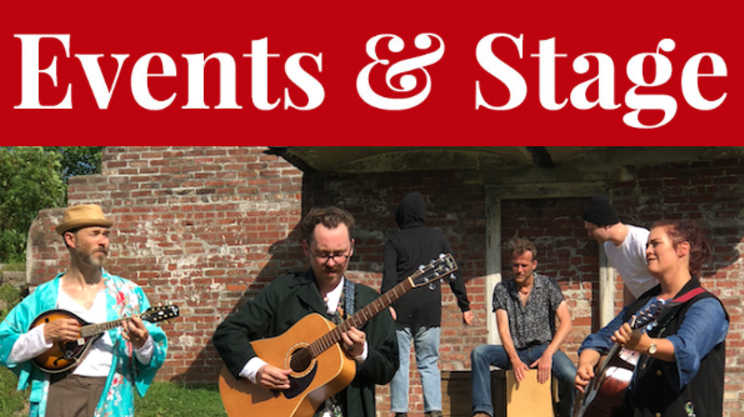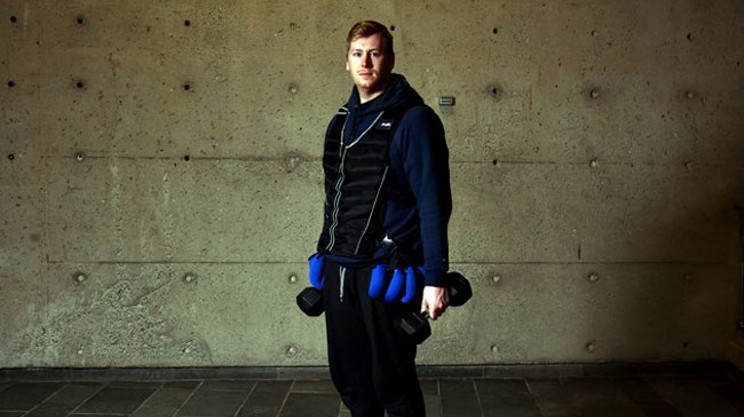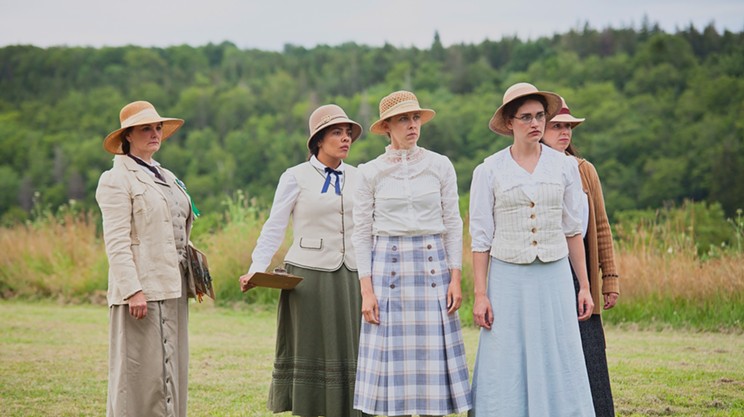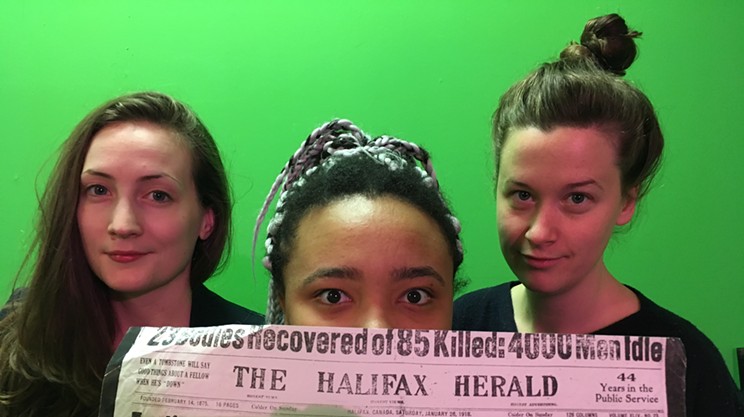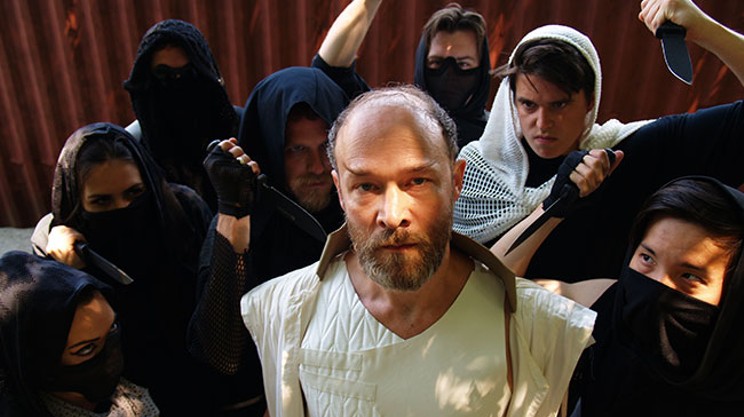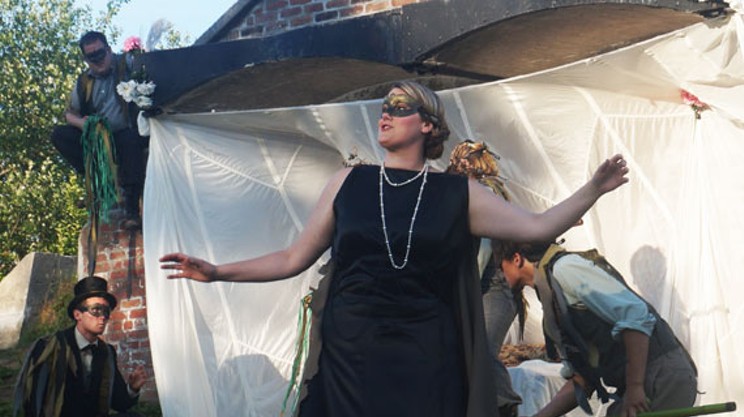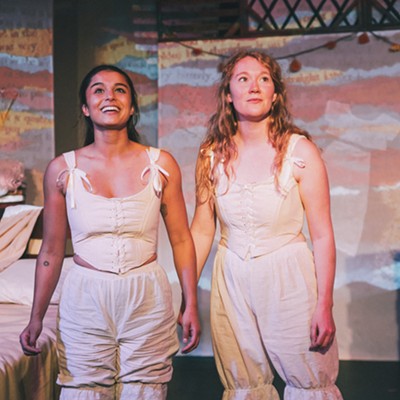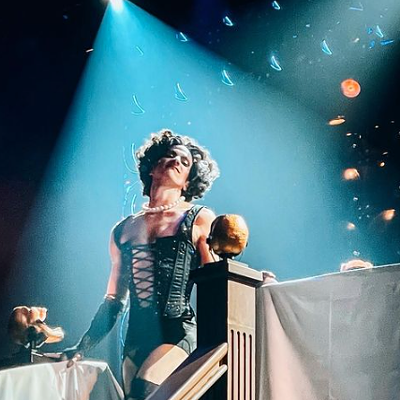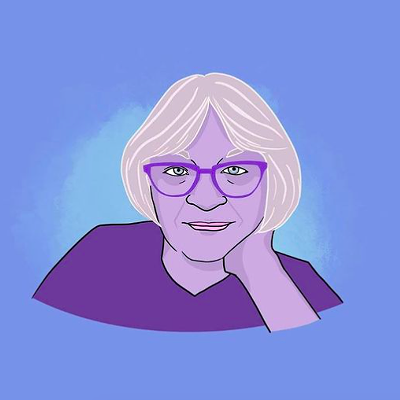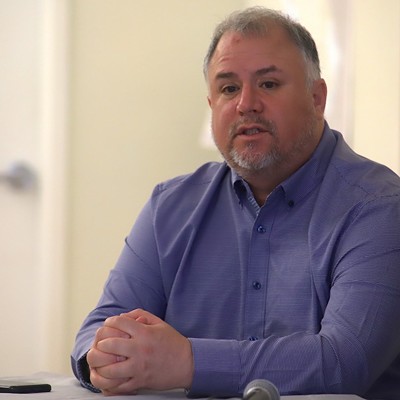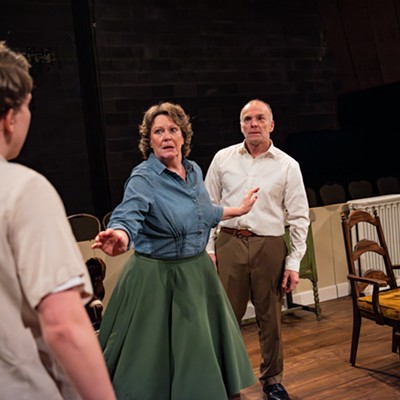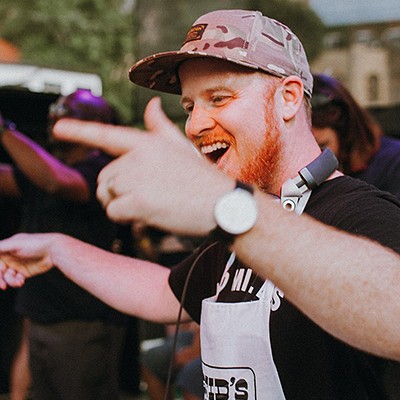Zuppa Theatre's 20th anniversary bash featuring
Pop-Up Love Party
Friday, April 20, 7pm
Murphy's Restaurant, 1751 Lower Water Street
$25-$40
25 Years by The Sea
Wednesday, April 25, 6:30pm
Halifax Central Library, 5440 Spring Garden Road
$25
This week, two Halifax theatre companies are celebrating milestones: Shakespeare By The Sea—founded in 1994 by Elizabeth Murphy and Patrick Christopher Carter—launches its 25th season on Wednesday. Zuppa Theatre Company—founded in 1998 by Sandy Gribbin, Jason MacIsaac and Ben Stone—will hit 20 years with a show and a dance party on Friday. To commemorate their birthdays, the current key creatives—SBTS's Murphy and Jesse MacLean; Zuppa's Stone, Susan Leblanc and Alex McLean—gathered at The Coast's office to break down the past couple decades. (Stewart Legere chimed in by phone.)
When you and Patrick started Shakespeare By The Sea, what was your vision at the time?
ELIZABETH MURPHY, SBTS: At the time it was just simply to get Shakespeare going in the park, because we were surprised it wasn't going on here. After my first visit to Point Pleasant Park, I saw the Cambridge Battery and then the Fort Ogilvie and thought "Wow, these are great places. I wonder if anything is going on here." And nothing was. But then I found out that it was more difficult than I thought. In fact, prior to me, people had tried to get something going but they couldn't. I was just lucky in hitting that one little opening where the Point Pleasant advisory committee had power, real power.
And we threw on this production of Twelfth Night. On opening night there were literally four people having a picnic in the Cambridge Battery, and they got up and left. We wanted to start at seven of course, because of the light, and people didn't come in. We had a meeting backstage: Should we go on? Yeah, let's go on. I said, "Just a sec, let me go look up the road." And I looked up the road and there was a thunder of people. They didn't know where to go. About 750 people showed up.
Zuppa was different. Was your goal to start a company, or was it that you were fresh out of school and you wanted to make work?
BEN STONE, ZUPPA: Initially it was to make work for ourselves, and when the first attempt worked, then we thought "Oh we should formalize this, and what do we actually want to do?" We founded it with the name the next year [1999]. We started building from there.
The mandate wasn't necessarily "We wanna do this sort of thing and always do this sort of thing," it was "Make shows that we think are cool and engaging, that aren't a specific thing, and each one's gonna be different."
We had Alex [McLean] in on the first show on the waterfront, to try and save a dying show we were doing, a Molière show we were rehearsing and we realized "This sucks. What are we gonna do?"
MURPHY: The hardest person in the world to do is Molière.
STONE: Then we called Alex in to save it.
SUSAN LEBLANC, ZUPPA: And he couldn't.
STONE: We ran it for maybe three nights and cancelled it. We went around town—it was a double bill with the other show we were doing—and we got a stamp at London Stamp and went around and X'd it all out.
What kind of funding was available to you? And how has that changed over the years?
MURPHY: We went immediately after corporate sponsorship, cause that's what I thought you did. Superstore was just coming into the province, they were just laying down their roots here, and they stayed with us for about three years. Has the funding changed in 25 years? A little bit, not a lot.
Everybody suffers from it. We have to work under the Independent Theatre Agreement and every year everything goes up by one to two percent. And when your funding stays the same year after year, in 10 years—think about it. You've gone up 20 percent in your weekly costs and your funding has stayed where it is. I'm not blaming anybody, I think if the province had more money to give they would give it; I think if the city had more money to give they would give it; they just don't know where to get it.
LEBLANC: That's one big change actually. Mike Savage, one of his [first] campaign promises was to make a real arm's length funding body for arts and he did it. He's not quite done it, but he's almost done. They established a council and so now we get operating funding from the city, where we could never access funding like that from the city before. It's not a ton, but it makes a big difference.
Has Zuppa's vision crystallized over time? Ever written it down?
LEBLANC: I don't think it's changed, it's been refined over the years. And we have written it down, you have to for your grants. For me it's always been a hard thing to talk about: So what do you guys do? You go to these festivals and you have to pitch your work and it's really hard. It's easier to pitch a show as opposed to the company.
STONE: It's always been "We are going to make theatre that excites us and challenges us that somehow speaks to our audience."
Did you expect to make it 20 and 25 years?
MURPHY: Never thought about it. After seven or eight years it seemed that it was fairly ongoing. And we've shifted a little—we brought in the family show, which Jesse heads up, that has brought in a whole new audience. I think we've got a fairly intelligent core audience. Some of our audience members are into their third generation. You guys didn't have kids when we started.
ALEX MCLEAN, ZUPPA: We sure do now.
LEBLANC: And we take them to Shakespeare By The Sea.
JESSE MACLEAN, SBTS: Sometimes we're doing Shakespeares that nobody here would ever have a chance to see. It's not that we're educating an audience, but how many people would have had the chance to see Antony and Cleopatra or Two Gentlemen of Verona in Halifax?
LEBLANC: We have moved our shows out of a traditional theatre context. Although when we began—on the waterfront, that was non-traditional, even Nosferatu or Door in the Wall, those weren't in theatres—we went into a more traditional theatre sense. And now our shows are in restaurants, in libraries, and now the next one will be all over town. I think that our audiences have trusted us and gone on that ride, that journey with us.
MCLEAN: My first Zuppa show, Nosferatu, we did it in the gym at Sacred Heart school. And there was no press coverage. We made that show—we were all working other jobs and rehearsing in the abandoned hospital—but it was an experimental show, very little text, with this musical score. It was kind of like a silent film on stage. And there was this incredible word of mouth about it. And we ran it for a week, and by the end it was selling out. People were just showing up and it was like, "How do you even know about this?" But there was a sense of a type of theatre, or a type of experience—there was a hole—and it felt like there was a palpable sense of excitement.
Do you consider yourselves talent incubators? MACLEAN: It's rewarding—for me at least, having been here for 15 years—seeing people's careers start to take hold who started at Shakespeare By The Sea. Thinking about Kat McCormack, Jacob Sampson, people that at 22 years old might not be cast in something right away, you give them a chance to develop.
STONE: This was the first summer we haven't been running an intensive training program in the Dal studios. Most of the people that have come into Zuppa have been through our education programs. Kat, for instance, was because Alex had directed her at Dal and as soon as she graduated she came in and did shows with us. Stew, likewise.
STEWART LEGERE, ZUPPA: First morning, first class. I walked into class and Sue Leblanc was my teacher.
MCLEAN: You want to work with people who are excited by what you do. Not just people who are looking for a gig. Inevitably with us—and we would love to hire people a lot more, but we usually can't—when we have it's because it's people who are excited by the work.
LEGERE: I think also students and emerging artists are attracted to the kind of work Zuppa does because it shows a different way you can be a theatre person. You don't just have to try to go and be in Shaw or Stratford.
What's the best production you've ever done?
LEBLANC: Five Easy Steps (to the end of the world) [2010]. We were experimenting with a new way of performing with each other, a more naturalistic type of scenes. It was also mixed in with absurd things like a big dance break. I loved the aesthetic, the look of it, I loved that I would cry every night, laugh and cry at the same time. It was my favourite performing moment.
MURPHY: Othello [2008]. It was really tight and to the point. There was also something about it, that it was just happening at that moment. It didn't have great costumes, it didn't have great anything. But the company really pulled it together. Jeremy [Webb] and Troy [Adams] were so amazing.
STONE: It's hard. Uncle Oscar [2003], Penny Dreadful [2007], Five Easy Steps. And Slowly I Turn [2012], too.
MCLEAN: Nosferatu [1999]. Something really clicked. It was our first time working together, there was this freshness, it felt like it came together.
LEGERE: Pop-Up Love Party [2015]. It marked a massive shift in the way we make stuff and the relationship between audience and performers.
MACLEAN: Robin Hood [2005]. It was the one that really started the roll of how popular the shows have become. Sometimes you put together a piece of theatre and you put the right people in the room, and it runs away. And you go, "I'm gonna just grab onto that."
This interview has been edited.


